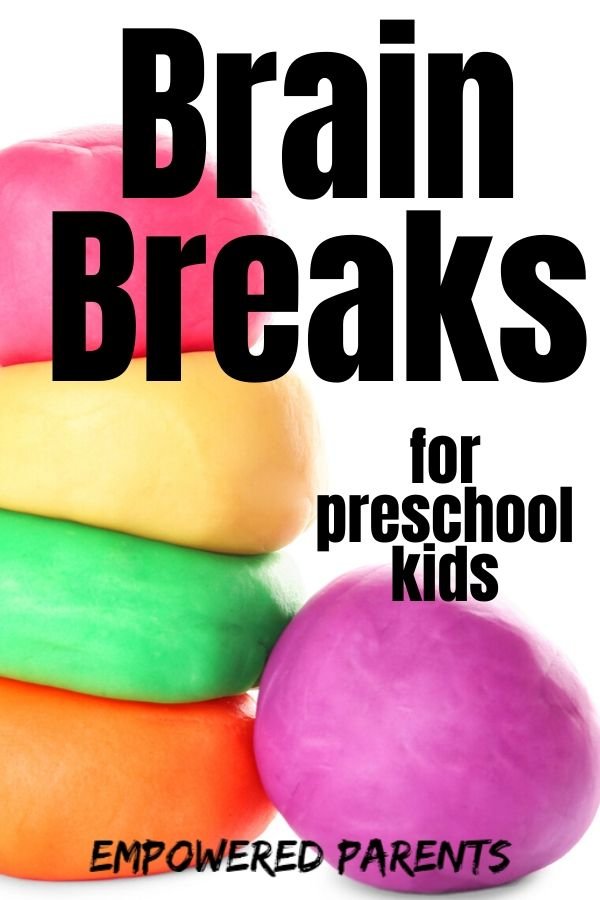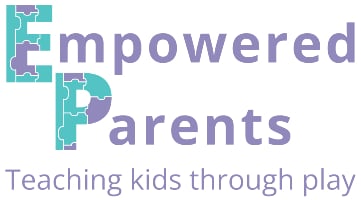Are you a parent looking for some brain break activities to help your kids get a time-out from whatever project they’re working on?
Are you a teacher looking for activities for the children in your preschool class?
Here are some great ideas that will work both in class and at home. There’s also a printable of these activities at the end of this post.
What is a Brain Break?
First off, what exactly is a ‘brain break’? Well, just as it sounds a brain break is a break from learning and concentrating for the brain.
This mental break provides processing time so that what is being learned can be sorted through by the brain, and therefore ‘filed away’ correctly and solidified.
The ability to process information is an important part of cognitive development.
Brain breaks work best when they involve some movement; the chance to get up and move around, send blood and oxygen to the brain, and relax, refresh and re-energise.
Brain breaks are typically short – around 2 minutes – as this is sufficient to refocus the brain.
The Benefits of Brain Breaks for Children
Most children can focus for a limited length of time in proportion to their age.
When they’re working on a longer project, frequent brain breaks will help to reset their minds so they can return to the project re-focused and in a better mental space.
Brain breaks help children to be calmer by providing them with opportunities to “get the wiggles out” and expend some of their energy by encouraging physical activity and movement.
For young children, movement is an important way of consolidating their learning as it allows them time to think through, process and file information correctly.
Brain breaks also reduce stress levels in children by promoting the release of serotonin, the happy, feel-good hormone, which brings stress levels down. When used effectively, brain breaks improve concentration and therefore learning.
10 Brain Break Activities for Preschoolers and Kindergarteners
Here are ten super fun brain break ideas for your kids.
1. Dance Party
Dancing is a really popular brain break activity as it gives the opportunity for large, gross motor movements and boosts serotonin, the feel-good hormone.

Put on an upbeat song and get the wiggles out with some dancing. Add in some dance scarves to really get kids moving and building those gross motor skills.
Try these cool movement songs for kids as well.
2. Numbered Moves
Assign a movement to each number on a dice. It might be a squat, a spin or a jump, then roll the dice and call out the number. The children then do the movement that corresponds with that number.
Kids could also assign their own movements to the numbers.
This has their brains focusing on something else and gets them making different connections as well as moving around.
3. Playdough Moves
Similar to a dance party, but easier to do sitting down, put on some music, and provide the children with a ball of playdough. As the song plays encourage them to make different shapes with the playdough.

This allows for some movement, creativity, enjoyment from listening to the music and, as an added bonus, gets the small muscles in their hands and wrists moving, tuning up those fine motor skills.
4. Vehicle Actions
Call out vehicle-type actions for the children to perform. For example, peddle your bicycle, spin like a helicopter or drive a car.
Get imaginative and you could apply this to whatever topic you’re learning about. Children could move like animals, act out parts of fairytales, or fall like leaves.
5. Balloon ‘Keep It Up’
A very simple way to have a movement break is to play ‘keep it up’ with a balloon.
Blow up a balloon (or several if you have a whole class of preschoolers) and encourage the children to keep the balloon up in the air by hitting it upwards.

This balloon game gets children moving, focusing on a common goal and laughing, so that they really feel the benefits of the break.
6. Mindfulness
Incorporating some mindfulness activities into your children’s day can help give their brain a rest. Brain breaks can be relaxing as well as re-energising, and mindfulness is known for its de-stressing qualities.

You might lead the children through some mindful breathing, ask them to listen carefully for little sounds in the environment or share a guided meditation.
7. Air Drawing
Put together a set of cards with different lines and shapes and have the children use their fingers to draw these shapes in the air for themselves.
Practising spatial awareness activates a different part of the brain, keeping it working while still having a break from the original project so that they return refreshed and ready to refocus.
8. Yoga Poses
Yoga is a great way to get oxygen moving around the body and stretch out large muscles.

Look up a few yoga poses, and lead from the front or use one of the great kids’ yoga channels available online for a quick yoga flow.
9. Collaborative Colouring Boards
Colouring is a super simple activity that suits a whole range of age groups.
Try to select something different to what small children would ordinarily be given. Something intricate, like a mandala or a picture from an adult colouring book, would be ideal.
Have this made larger and displayed on a vertical board where a number of children can work together on the colouring as a brain break. Colouring vertically encourages movement and requires greater control.
10. Craft Stick Challenges
Provide a selection of craft sticks and photographic examples of shapes that can be made using craft sticks. Let the children get up, choose a photo and quickly work on putting that shape together against the clock.

This keeps brains going, but with a quick, manageable, different kind of project so that children return ready to refocus on the project at hand.
I hope you’ll find these brain breaks for preschoolers useful to try at home or at school.
10 of the Best Brain Breaks to Help Your Preschoolers Focus
Notes
What is a Brain Break?
Just as it sounds, a brain break is a short break from learning and concentrating for the brain.
This mental break provides processing time so that what is being learned can be sorted through by the brain, and therefore filed away correctly and solidified. The ability to process information is an important part of cognitive development.
Brain breaks work best when they involve some movement; the chance to get up and move around, send blood and oxygen to the brain, and relax, refresh and re-energise.
They are typically short—around 2 minutes—as this is sufficient to refocus the brain.
The Benefits of Brain Breaks for Children
Most children can focus for a limited length of time in proportion to their age.
When they’re working on a longer project, frequent brain breaks will help to reset their minds so they can return to the project re-focused and in a better mental space.
Brain breaks help children to be calmer by providing them with opportunities to “get the wiggles out” and expend some of their energy through movement.
For young children, movement is an important way of consolidating their learning as it allows them time to think through, process and file information correctly.
Brain breaks also reduce stress levels in children by promoting the release of serotonin, the happy, feel-good hormone. When used effectively, brain breaks improve concentration and therefore learning.
10 Brain Break Activities for Preschoolers and Kindergarteners
Here are ten super fun brain break ideas for your kids.
1. Dance Party
Dancing is a really popular brain break activity as it gives the opportunity for large, gross motor movements and boosts serotonin, the feel-good hormone.
Put on an upbeat song and get the wiggles out with some dancing. Add in some dance scarves to really get kids moving and building those gross motor skills.
2. Numbered Moves
Assign a movement to each number on a dice. It might be a squat, a spin or a jump. Roll the dice and call out the number, and the children do the corresponding movement.
Kids could also assign their own movements to the numbers. This has their brains focusing on something new while also moving their bodies.
3. Playdough Moves
Similar to a dance party, but easier to do sitting down, put on some music and provide each child with a ball of playdough. As the song plays, encourage them to make different shapes with the playdough.
This allows for movement, creativity, listening to music, and also strengthens the small muscles in their hands and wrists.
4. Vehicle Actions
Call out vehicle-type actions for the children to perform. For example, peddle your bicycle, spin like a helicopter or drive a car.
You can adapt this to different themes—animals, fairytales, or even seasonal movements like falling leaves.
5. Balloon ‘Keep It Up’
A simple way to have a movement break is to play ‘keep it up’ with a balloon.
Blow up a balloon (or several if you have a whole class) and encourage the children to keep it up in the air by hitting it upwards.
This game gets children moving, focusing on a common goal and laughing, so they really feel the benefits of the break.
6. Mindfulness
Brain breaks can also be calming. Lead children through mindful breathing, ask them to listen carefully for small sounds in the environment, or try a short guided meditation.
Mindfulness is known for its de-stressing qualities and is a great way to give brains a rest.
7. Air Drawing
Make cards with different lines and shapes, then have children use their fingers to draw these shapes in the air.
This practises spatial awareness and activates a different part of the brain, keeping it engaged while still resting from the main task.
8. Yoga Poses
Yoga is a great way to get oxygen moving around the body and stretch out large muscles.
Lead a few simple poses yourself, or follow a short kids’ yoga flow from one of the many great online channels.
9. Collaborative Colouring Boards
Choose something a bit different from the usual children’s colouring sheets, like a mandala or a picture from an adult colouring book.
Print it larger and display it on a vertical board. A group of children can colour together, which encourages movement and requires greater control.
10. Craft Stick Challenges
Provide a set of craft sticks and pictures of shapes that can be made with them. Children can pick a photo and quickly build the shape against the clock.
This keeps their brains working in a different way while offering a quick, fun, hands-on challenge.


Helena
Tuesday 26th of January 2021
Have A Bonus Grandson; My Daughterl Adopted @ 2yrs Old & Had Since He Was 3 Wks Old. He Seemed So Smart, Has So Many Educational & Learning Toys. But Now Will Not Even Look @ Color 2 Answer Correctly. He Looks 2 Sky & Guesses... Will Try Brain Breaks,,, Thank U Trying 2 Help Make Sure He Is Ready 4 School. Hopefully Will Make Progress Soon.
Tanja Mcilroy
Tuesday 26th of January 2021
Good luck Helena. Remember, always make it fun and if you are concerned there may be emotional or other concerns preventing him from developing, consult a professional for advice.
lalitha Sundaram
Friday 3rd of July 2020
Hi I am laiitha from India. I really enjoy reading your activities . They are very well designed,appropraitely fits the age group. I am a retired pre_sschool/elementary teacher. I have my own blog in facebook nurturingtheyoungminds Thank you dear, lalitha Sundaram
Tanja Mcilroy
Tuesday 7th of July 2020
Thank you Lalitha!